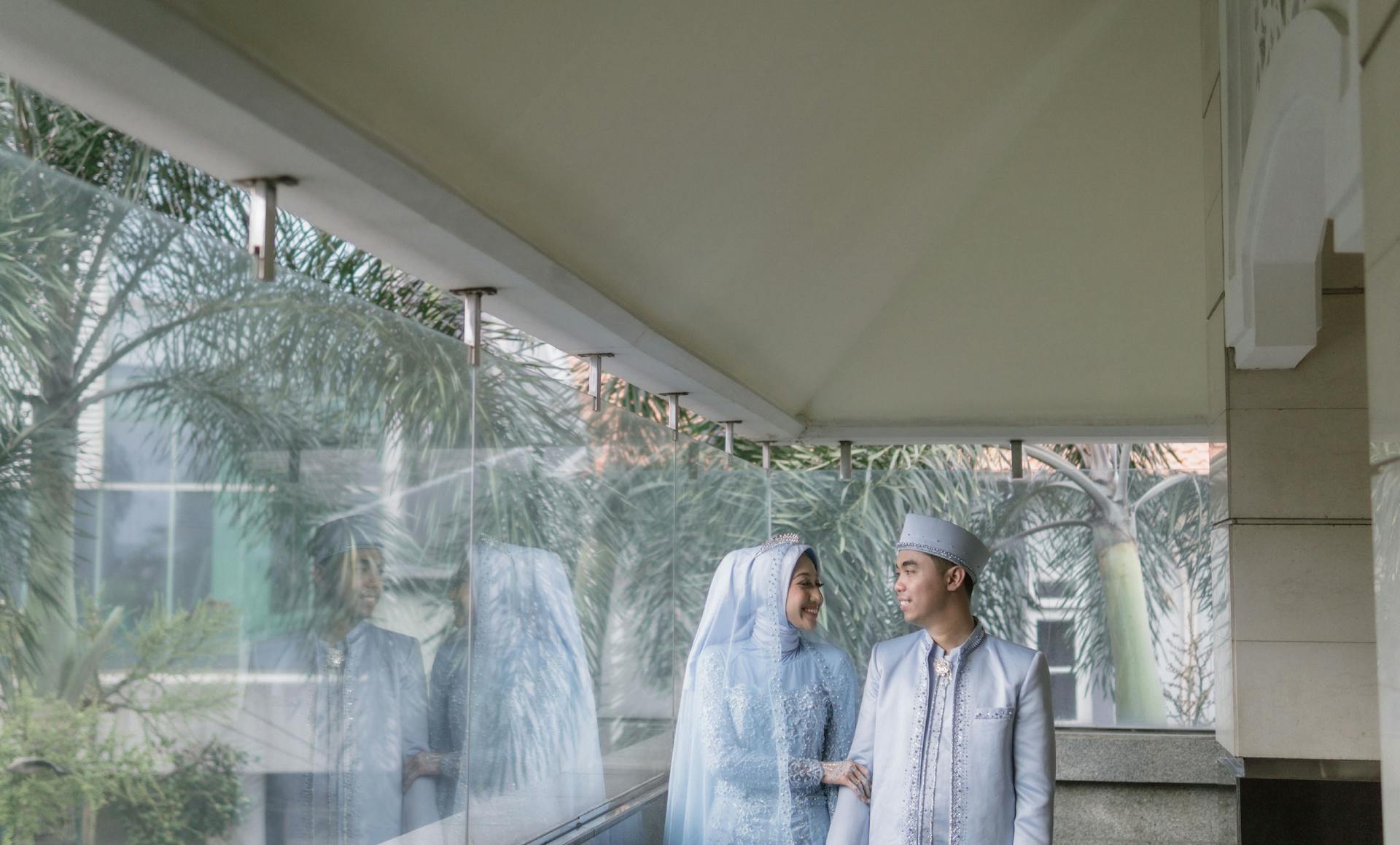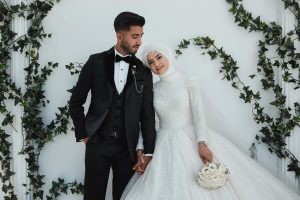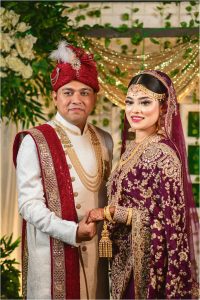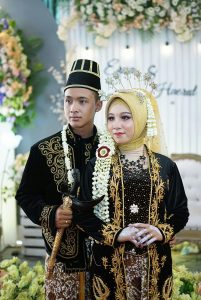
Introduction to Muslim wedding attire
Muslim weddings are vibrant and rich in cultural traditions. One of the most important aspects of any wedding is the attire worn by the bride, groom, and guests. Muslim wedding attire is known for its elegance, modesty, and intricate designs. In this ultimate guide, we will explore the various types of traditional and modern Muslim wedding attire, as well as provide tips on how to choose the perfect outfit for your special day.
Traditional Muslim wedding attire for brides
When it comes to Muslim wedding attire for brides, the sari is a popular choice. A sari is a long piece of fabric that is draped around the body, often worn with a blouse and petticoat. It is a versatile garment that can be styled in different ways, depending on the region and culture. Another traditional option for brides is the lehenga, which is a skirt and blouse ensemble. The lehenga is often heavily embroidered and embellished with beads, sequins, and other intricate details.
For a more conservative look, some brides opt for the abaya. An abaya is a loose-fitting gown that covers the entire body, typically worn over other clothing. It is often made from flowing fabrics such as chiffon or silk and can be embellished with embroidery or other decorative elements. Another popular choice is the hijab, a headscarf worn by Muslim women to cover their hair. The hijab can be paired with a variety of outfits, including dresses, suits, or traditional Muslim attire.
Traditional Muslim wedding attire for grooms

Just like brides, grooms have a wide range of traditional attire options to choose from. One popular choice is the kurta, a loose-fitting tunic that is often worn with matching trousers. The kurta can be made from various fabrics such as silk, cotton, or brocade, and can be embellished with embroidery or other decorative details. Another traditional option is the thobe, a long robe-like garment that is commonly worn in Middle Eastern countries. The thobe is usually made from lightweight fabrics such as linen or cotton and is often worn with a head covering called a keffiyeh.
For a more formal look, grooms often choose the sherwani. A sherwani is a long coat-like garment that is worn over a kurta and trousers. It is typically made from rich fabrics such as silk or velvet and is heavily embroidered or embellished with intricate details. Another option for grooms is the western suit, which is a popular choice for those who prefer a more modern and contemporary look.
Modern trends in Muslim wedding attire

In recent years, there has been an emergence of modern trends in Muslim wedding attire. Many designers are incorporating traditional elements with contemporary designs to create unique and stylish outfits. For example, some brides are opting for fusion outfits that combine elements of Western and traditional Muslim attire. These fusion outfits often feature Western silhouettes such as A-line or mermaid-style gowns, paired with traditional embroidery or embellishments.
Grooms are also embracing modern trends by experimenting with different cuts, colours, and fabrics. Some grooms are opting for tailored suits in bold colours such as burgundy, navy, or emerald green. Others are choosing to wear traditional attire with a modern twist, such as a sherwani with a slim-fit silhouette or a thobe with contemporary embroidery designs.
Choosing the right fabric for Muslim wedding attire
Choosing the right fabric for your Muslim wedding attire is essential for both comfort and style. For brides, lightweight and breathable fabrics such as silk, chiffon, or georgette are popular choices. These fabrics drape beautifully and allow for ease of movement. Additionally, they are often embellished with delicate embroidery or beadwork, adding a touch of elegance to the attire.
For grooms, fabrics such as silk, brocade, or velvet are commonly used in traditional attire. These fabrics have a luxurious and regal feel, perfect for a special occasion like a wedding. However, it is important to consider the weather and location of the wedding when choosing the fabric. For warmer climates, lightweight fabrics such as linen or cotton blends are recommended to ensure comfort throughout the day.
Finding the perfect color for Muslim wedding attire

The choice of color for Muslim wedding attire is a personal preference, but there are certain colours that are traditionally associated with weddings. For brides, shades of red, maroon, and gold are considered auspicious and symbolize love and prosperity. However, modern brides are also experimenting with other colours such as pastels, neutrals, or even bold hues like royal blue or emerald green. It is important to choose a color that complements your skin tone and personal style.
Grooms traditionally opt for neutral or earthy tones such as beige, cream, or gold. These colors exude elegance and sophistication. However, modern grooms are also embracing bolder colors such as navy, burgundy, or even black. The key is to choose a color that complements the bride’s attire and creates a harmonious overall look for the couple.
Tips for accessorizing Muslim wedding attire
Accessories play a crucial role in completing the look for both brides and grooms. For brides, statement jewellery such as necklaces, earrings, and bangles can add a touch of glamour to the attire. It is important to choose accessories that complement the embroidery or embellishments on the outfit. Additionally, a traditional headpiece such as a maang tikka or matha patti can add a regal touch to the overall look.
Grooms can accessorize their attire with a variety of options. One popular choice is a traditional turban or pagri, which can be embellished with intricate embroidery or brooches. Another option is to wear a stylish brooch on the sherwani or thobe. Additionally, cufflinks, pocket squares, or a stylish watch can add a touch of sophistication to the groom’s ensemble.
Where to buy Muslim wedding attire
Finding the perfect Muslim wedding attire can be a daunting task, but there are several options available. Many cities have dedicated stores or boutiques that specialize in Muslim wedding attire. These stores offer a wide range of options for both brides and grooms, as well as accessories and jewellery. Additionally, there are several online platforms that offer a curated selection of Muslim wedding attire from various designers and brands.
It is also worth considering hiring a designer or a tailor to create a custom-made outfit. This allows you to have input in the design process and ensures that the outfit fits you perfectly. Additionally, it gives you the opportunity to incorporate unique details or embellishments that reflect your personal style.
Muslim wedding attire for guests and family members
Muslim wedding attire is not limited to the bride and groom; guests and family members also have the opportunity to dress in traditional or modern attire. For female guests, options such as saris, lehengas, or abayas are popular choices. These outfits can be accessorized with statement jewellery and a matching clutch or handbag. For male guests, traditional attire such as kurtas or sherwanis is a common choice. Western suits are also acceptable, especially for more formal weddings.
It is important to remember that Muslim wedding attire should be modest and respectful of the cultural traditions. It is advisable to avoid wearing revealing or inappropriate clothing. If you are unsure about the dress code, it is best to consult with the bride and groom or their family members.
Conclusion: Embracing diversity in Muslim wedding attire
Muslim wedding attire is a beautiful reflection of cultural traditions and personal style. Whether you choose a traditional outfit or a modern fusion ensemble, the key is to embrace diversity and celebrate the uniqueness of each individual. By following the tips and guidelines provided in this ultimate guide, you will be well-equipped to find the perfect Muslim wedding attire that reflects your personal style and makes you feel confident on your special day.
Are you ready to find your perfect Muslim wedding attire? Explore the wide range of options available and embrace the beauty of cultural traditions. Remember, your wedding day is a celebration of love and diversity, and your attire should reflect that. Happy shopping!

